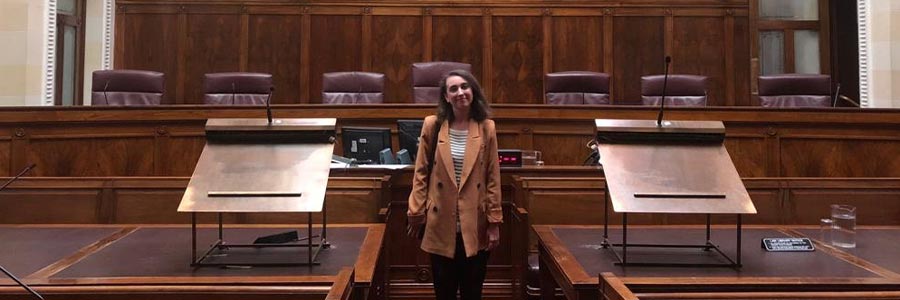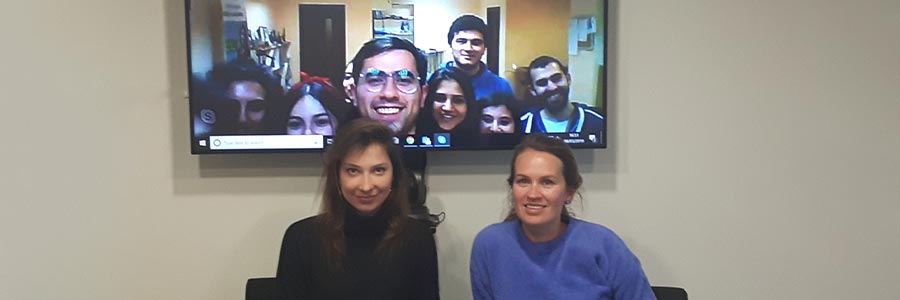IBAHRI activities in Azerbaijan in 2019
October 2019:
IBAHRI condemns use of police violence against protesters in Azerbaijan
The International Bar Association’s Human Rights Institute (IBAHRI) has received information regarding police violence being used against protesters between 20 and 21 October 2019. Arbitrary arrest and detention are allegedly being used to stem freedom of expression and assembly and punish those speaking critically of the Azerbaijani government. It is being claimed that police used unreasonable force against protesters and that the peaceful rallies were targeted with mobile coverage interference to reduce means of communication.
The IBAHRI condemned the actions against the protesters, urging Azerbaijani authorities to comply.
September 2019:
Launch of IBAHRI’s 3rd Mentorship Programme in Baku, Azerbaijan
Following a success and a great evaluation of the first two International Bar Association’s Human Rights Institute’s Mentorship Programmes in Azerbaijani, IBAHRI re-launched the Programme again in 2019.
The programme, which partners junior and senior Azerbaijani lawyers and runs for 6 months, aims to facilitate the sharing of experiences and information on legal work between the two groups.
Learning at the law schools only are not sufficient for any result-oriented future lawyer, therefore initiatives like these are vital to the sustainability and progression of rule of law around the world. The programme helps the junior lawyers put their legal knowledge to practice, improve their legal skills, and test if lawyering is a profession they really want to take up.
The IBAHRI is strongly committed to supporting young Azerbaijani lawyers interested in safeguarding the rule of law and human rights, and will be expanding its engagement with them through the rest of this year.
June 2019:
Preliminary meetings for a new venture into law clinics for the IBAHRI in Azerbaijan
Following suggestions by Azerbaijani law students, the IBAHRI is beginning efforts to set up a law clinic in Azerbaijan. Clinics are taking off as a key educational tool. Students can gain hands-on experience in the practice of law by providing pro bono support to partners and clients.
The International Bar Association’s Human Rights Institute (IBAHRI) has held a preliminary meeting with the ADA University in Baku, Azerbaijan to discuss the possibility of opening a law clinic at the University. The new venture for the IBAHRI was formed out of a suggestion given by alumni of the IBAHRI’s Mentorship Programme in Azerbaijan. The brilliant initiative from the young lawyers would allow law students to further develop their legal knowledge and widen their practical experience.
Law clinics are increasing in popularity around the globe and take many different forms. Some clinics provide free legal advice and assistance with the representation of clients, often filling gaps in the provision of legal aid. Others work with civil society organisations to provide research for the partners’ human rights work.
Through clinics, students are able to obtain hands-on experience in legal practice and clients are provided pro bono support in their activities or cases. Academic Henry Steiner has argued that ‘[t]he unmistakeable value of clinical human rights work stems partly from its leading students to experience the dilemmas in and sheer obstacles to the realization of human rights norms.’ Writing about the clinic at SOAS University in London, Professor Lynn Welchman describes how students are, through the clinic, able ‘to experience the tensions of theory and practice.’
The IBAHRI will be continuing discussions with key bodies and individuals in the upcoming months.
May 2019:
Law essay winner completes internship in Dublin
In May 2019, the winner of our 2018 Law Essay Competition for Azerbaijani law students completed a one-week internship in Dublin, Ireland. Impressing everyone she met, the winner excelled in the fast-paced environment.
Towards the end of 2018, the International Bar Association’s Human Rights Institute (IBAHRI) held the Law Essay Competition for law students in Azerbaijan. The students were encouraged to introduce new ideas to the field and produce a critical piece of work. First prize, a weeklong internship with a leading Irish lawyer in Dublin, was awarded to Fidan who impressed the panel of judges with her creativity and passion. Fidan spent her week at the Law Library of the Four Courts, observing a criminal trial, attending a housing law clinic and meeting with distinguished human rights lawyers.
The IBAHRI would like to give a huge congratulations to Fidan for her fantastic work.

Creative, critical and impassioned debates in IBAHRI human rights training workshop for Azerbaijani students
The workshops held in May 2019 covered privacy law, freedom of expression and the prevention of torture. Students were given theoretical training and practical engagement with case studies.
In another activity aimed at broadening young Azerbaijani law students’ experience in human rights work, the International Bar Association’s Human Rights Institute (IBAHRI) held a series of human rights workshops in May 2019 in Tbilisi, Georgia. The students had the opportunity to discuss privacy law, freedom of expression and legal mechanisms for tackling torture.
Experts from Europe and Azerbaijan were enlisted to deliver the trainings and brought with them a wide range of experience in litigation before the European Court of Human Rights and advocacy with non-governmental organisations. The workshops balanced theoretical training in domestic and international law, particularly regarding human rights mechanisms at the United Nations, and practical experience mooting with real case studies. The debates were a particular highlight for participants and trainers alike with students applying creative and astute arguments as the prosecution and defence.
The workshops are part of the IBAHRI’s wider programme of engagement with young Azerbaijani lawyers. We run the IBAHRI Mentorship Programme and hold conferences for law students. We have also run an essay competition as well as an internship and are currently in the process of developing a legal clinic at ABA University in Baku, Azerbaijan. The students bring immense enthusiasm to every activity. They drive the projects to cater for their interests and career aspirations.
The IBAHRI is certain these young lawyers will be at the forefront of great change in years to come. We look forward to supporting them along the way.
March 2019:
Freedom of Expression webinar for Azerbaijani young lawyers held by IBAHRI
In a first of its kind for the IBAHRI, we held a webinar aimed at giving young Azerbaijani lawyers practical information on their own right to freedom of expression in March 2019. Lawyers in Azerbaijan can face disciplinary measures and disbarment for speaking publicly against State officials.
‘Lawyers like other citizens are entitled to freedom of expression, belief, association and assembly. In particular, they shall have the right to take part in public discussion of matters concerning the law, the administration of justice and the promotion and protection of human rights and to join or form local, national or international organizations and attend their meetings, without suffering professional restrictions by reason of their lawful action or their membership in a lawful organization.’
United Nations Basic Principles on the Role of Lawyers, paragraph 23
In March 2019, the International Bar Association’s Human Rights Institute (IBAHRI) brought together a group of young and passionate Azerbaijani lawyers to discuss freedom of expression for lawyers and why it is so vital to the credibility and integrity of the legal profession. Giving the webinar was Jurate Guzeviciute, IBAHRI Programme Lawyer, and Ramute Remezaite, a European lawyer with extensive experience in litigation before the European Court of Human Rights.
The difference between in-court and out of court expression was explored in the discussions, along with what it means to balance the responsibility to raise matters of public interest with maintaining the authority of the judiciary.
The webinar gave a practical approach, aiming to imbue the lawyers with the knowledge of their own rights and the means of defending them. In Azerbaijan, lawyers can face threats and disciplinary measures including disbarment for speaking critically in the public sphere. Last month, human rights lawyer Yalchin Imanov was disbarred for speaking with the media about the alleged torture of one of his clients committed by prison officials. The issue of freedom of expression for lawyers is highly pertinent in Azerbaijan and the IBAHRI will be looking to further its efforts in raising awareness of lawyers’ rights in this context.

February 2019:
The IBAHRI holds trainings with Azerbaijani lawyers and law students on international human rights standards
Law students and independent lawyers received a peer-to-peer training on United Nations human rights standards and the principles of the independence of the legal profession in February 2019.
According to the Azerbaijani Bar Association, there are a total of 1,503 qualified lawyers for a population of 10 million. In comparison, Sweden has a similar population to Azerbaijan but has over 5,800 practicing lawyers. In the United Nations Human Rights Committee’s concluding observations on Azerbaijan’s implementation of the International Covenant on Civil and Political Rights in 2016, the Committee expressed strong concern with the inadequate number of lawyers.
Access to qualified, independent lawyers is central to access to justice and the protection of fundamental rights and freedoms. Civil society has been all but wiped out under the State’s increasingly repressive and authoritarian laws. Subsequently, not only are there few lawyers but human rights law is sorely undervalued within legal education in the country.
For these reasons, the International Bar Association’s Human Rights Institute (IBAHRI) focuses a great deal of its work in Azerbaijan on training young lawyers to encourage a new generation with a commitment to human rights principles.
In February 2019, the IBAHRI held a peer-to-peer training event in the state capital of Baku on the human rights standards and principles for ensuring independence of the legal profession set by the United Nations. In attendance were law students and independent lawyers. The event provided an important opportunity for the participants to network. All showed great eagerness to expand their human rights training as well as dedication to promote and apply the principles in their daily activities. While lawyers face significant challenges in the country, Azerbaijan is not short of individuals determined to make a difference.
1 Henry J Steiner, ‘The University’s Critical Role in the Human Rights Movement’ (2002) 15 Harv Hum Rts J 317, 326.
2 Lynn Welchman, ‘The International Human Rights Clinic at SOAS’ in Alberto Alemanno and Lamin Khadar (eds) Reinventing Legal Education: How Clinical Education is Reforming the Teaching and Practice of Law in Europe (CUP 2018), 248.
3 https://barassociation.az/en/azecollegium
4 https://www.advokatsamfundet.se/Advokatsamfundet-engelska/About-us/
5 HRC, ‘Concluding Observations on the Fourth Periodic Report of Azerbaijan’ (16 November 2016) UN Doc CCPR/C/AZE/CO/4, paras 24-25.